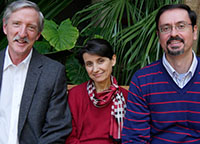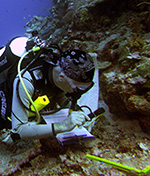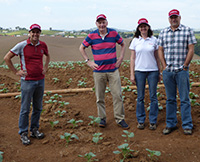Departmental news
New IGGY Life Sciences Pages
The new IGGY Life Sciences pages go live today with a competition for IGGY members. Winners will receive free tickets to New Scientist Live.
For a short period the pages are open for non-members to view.
Need more information about IGGY?
Warwick-Monash Alliance funds workshop on Autophagy research
 On September 24-25, a Warwick-Monash Alliance funded workshop on Autophagy research was held at Monash University. The workshop was organised by Professor Rodney Devenish (Department of Biochemistry & Molecular Biology, Monash University) and Associate Professor Dr Ioannis P. Nezis (School of Life Sciences, University of Warwick). The workshop included formal presentations, an idea-sharing forum, small group interactions and a public lecture with keynote speaker Professor Ana Maria Cuervo, a world-leader in autophagy research field, from Institute for Aging Research, Albert Einstein College of Medicine in New York. The main focus of the workshop was to bring Warwick and Monash researchers together to collaborate and to develop ideas and concepts for future joint funding.
On September 24-25, a Warwick-Monash Alliance funded workshop on Autophagy research was held at Monash University. The workshop was organised by Professor Rodney Devenish (Department of Biochemistry & Molecular Biology, Monash University) and Associate Professor Dr Ioannis P. Nezis (School of Life Sciences, University of Warwick). The workshop included formal presentations, an idea-sharing forum, small group interactions and a public lecture with keynote speaker Professor Ana Maria Cuervo, a world-leader in autophagy research field, from Institute for Aging Research, Albert Einstein College of Medicine in New York. The main focus of the workshop was to bring Warwick and Monash researchers together to collaborate and to develop ideas and concepts for future joint funding.
Formed in early 2012, the Monash Warwick Alliance represents an innovation in higher education and research and aims to accelerate the exchange of people, ideas and information between Monash University and the University of Warwick.
(Image: Prof Devenish, Prof Cuervo and Prof Nezis)
Marine conservation research in top 20 global impact case studies
 The UK Collaborative on Development Sciences (UKCDS) has listed the School of Life Sciences marine conservation case study as one of its top 20 favourite impact stories showing how research is improving lives of people around the world. The study led by Prof Charles Sheppard was selected from 6,975 impact case studies submitted to the Research Excellence Framework (REF) which is a system used to assess research quality in UK universities.
The UK Collaborative on Development Sciences (UKCDS) has listed the School of Life Sciences marine conservation case study as one of its top 20 favourite impact stories showing how research is improving lives of people around the world. The study led by Prof Charles Sheppard was selected from 6,975 impact case studies submitted to the Research Excellence Framework (REF) which is a system used to assess research quality in UK universities.
The case study shows how Prof Charles Sheppard and colleagues have been co-ordinating new approaches to coral reef conservation, restoration and management, using the coral reefs and islands in the Chagos Archipelago as a reference site. Underpinned by UK research, this British Indian Ocean Territory has now been declared a Marine Protected Area, supporting ecosystem conservation to benefit tropical habitats and help preserve livelihoods in some of the poorest countries in that region.
For full details visit UKCDS Conserving marine environments
(Image courtesy of Anne Sheppard)
Plant science collaboration with Brazil to improve vegetable crops
 Dr John Walsh
Dr John Walsh , Associate Professor in the School of Life Sciences, and his collaborators have been awarded £15,000 for a research project on the characterisation of Potyviruses infecting vegetable crops in Brazil. The project was funded through the FAPESP SPRINT
, Associate Professor in the School of Life Sciences, and his collaborators have been awarded £15,000 for a research project on the characterisation of Potyviruses infecting vegetable crops in Brazil. The project was funded through the FAPESP SPRINT scheme (São Paulo Researchers in International Collaboration), which aims to encourage and promote the advancement of scientific research through partnerships between researchers in São Paulo State and overseas. The University of Warwick is one of only five UK institutions that has partnered with the São Paulo Research Foundation (FAPESP) to support this scheme.
scheme (São Paulo Researchers in International Collaboration), which aims to encourage and promote the advancement of scientific research through partnerships between researchers in São Paulo State and overseas. The University of Warwick is one of only five UK institutions that has partnered with the São Paulo Research Foundation (FAPESP) to support this scheme.
Dr Walsh’s project will be carried out in collaboration with Prof Elliot Kitajima from the University of São Paulo’s Department of Plant Pathology and Nematology in Piracicaba and Dr Marcelo Eiras from the Instituto Biologico in São Paulo. Initial activities to develop this partnership were supported by the University of Warwick’s Brazil Partnership Fund in 2014. The Brazilian operation of the commercial seed company Sakata are also involved in the research programme.
Potyviruses cause significant losses in agricultural, pastoral, horticultural and ornamental crops. This project focusses on Turnip mosaic virus (TuMV), which causes diseases in the economically important brassica family of crops including broccoli, cauliflower, cabbage, turnip and oilseed rape. Through determining the diversity of TuMV and investigating broad-spectrum resistance to the virus the team is expecting to identify naturally occurring resistance genes which can then be introduced into commercial crop lines. The collaboration brings together complementary expertise in plant science research which will lead to significant synergies and knowledge exchange, but also has the potential to generate substantial societal and economic benefits through collaboration with industry and the resulting exploitation of intellectual property.
GARNish newsletter puts spotlight on plant science at Warwick
 The latest GARNish newsletter highlights plant science in Life Sciences, profiling the work of our academics.
The latest GARNish newsletter highlights plant science in Life Sciences, profiling the work of our academics.
'Plant science research at the University of Warwick is characterised by the breadth of expertise - from fundamental molecular mechanisms to projects with direct application to industry. We have world-class basic science in signalling, gene regulation, development, plant– environment (microbes, virus, soil) interactions, and evolution through to pest management, crop genetics and genomics underpinning the development of new varieties.'
Read the newsletter (pdf)
Getting agricultural information to smallholder farmers can help improve food security
BBSRC-funded PhD student Andrew Tock, from Warwick Crop Centre, explores 'plant clinics' in Uganda where farmers can receive objective and impartial advice on how to best treat their crops to protect them from pests. The diary is based on a three-month project in Uganda, and part of the Midlands Integrative Biosciences Training Partnership (MIBTP), a BBSRC-funded Doctoral Training Partnership. Find out more in Andy's blog.
Video courtesy of BBSRC
Life Sciences researchers feature in scientific video journal
Sophie Piquerez, Alex Jones and Vardis Ntoukakis describe a protocol for the purification and characterization of plant protein complexes in the latest Journal of Visualized Experiments (JoVE) video. Using Nicotiana benthamiana and the tomato Prf/Pto complex as a model, they demonstrate that by immunoprecipitating a single protein within a complex, they can identify its post-translational modifications and its interacting partners.
